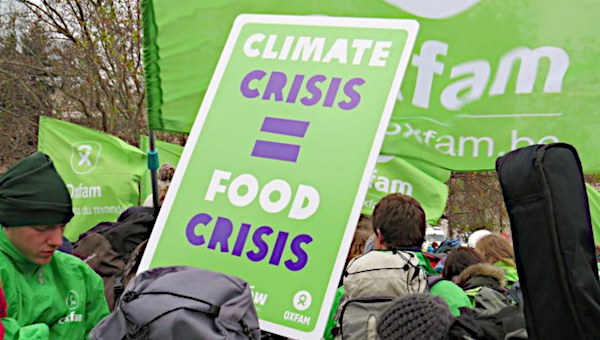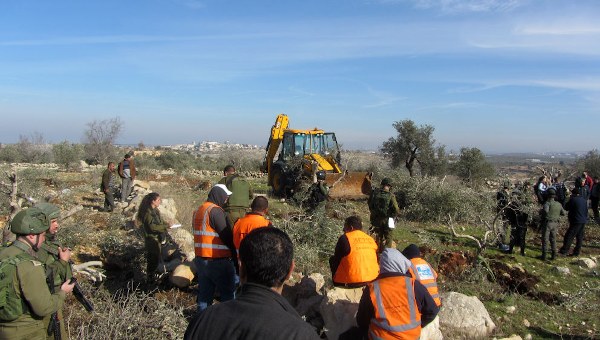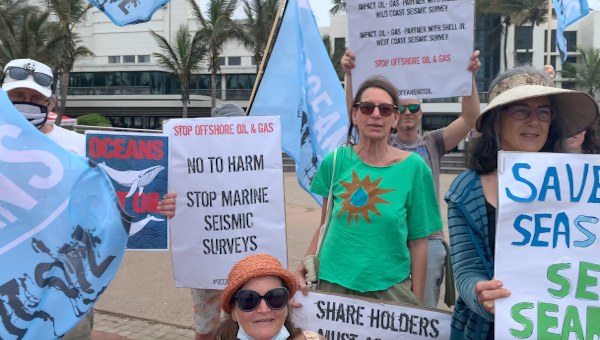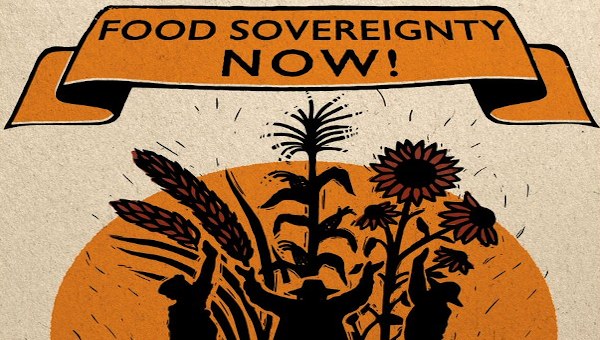South Africa: Climate Justice Charter
Part 1: Background
1.1 Introduction
We care about the climate crisis and its implications for all in South Africa as well as for all life on planet Earth. With a 1-degree Celsius increase in planetary temperature since before the industrial revolution, extreme weather shocks (droughts, floods, wild fires, tornadoes, heat waves), eco-system collapse, sea level rise, together with major stresses on the Earth’s systems, everything is changing fast. Irreversible changes to the Earth’s systems are not locked in yet and climate science confirms that action is critical to prevent further planetary heating, catastrophic climate breakdown and ensure climate justice, for those least responsible but who will be most affected. We need to address the root causes of the problem through unifying, all-encompassing and deeply transformative action. It is time for a common vision, clear goals, guiding principles and alternatives from below to lead the climate justice movement to secure a different future, where all human and non-human life is sustained. A Climate Justice Charter (CJC), developed in a participatory manner, is one way to do this.
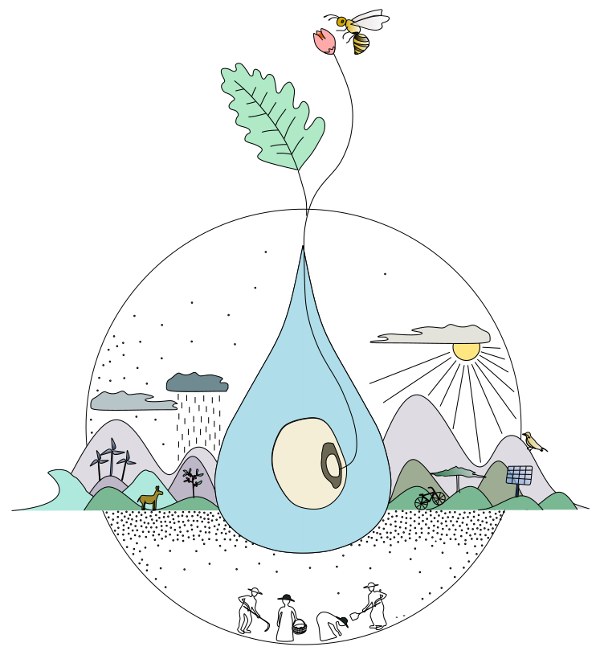
The Co-operative and Policy Alternative Centre (COPAC), together with the South African and Food Sovereignty Campaign (SAFSC), and other civil society organisations have engaged in a process to develop a Climate Justice Charter for South Africa. The process has been the culmination of campaigning for food sovereignty and climate justice, during our drought.
1.2 Process to Develop the Climate Justice Charter
The process of developing this charter has been a participatory, grassroots process. While it is rooted in five years of campaigning for food sovereignty and climate justice, the following processes have helped crystallise the contents of the draft charter:
- Water and climate conference 2018: Toward the end of 2018, COPAC hosted a conference to launch our water sovereignty activist guide and initiate a water justice charter process. It was immediately clear that the need for a charter went beyond just water justice, but rather for a climate justice charter for South Africa, something similar to the Freedom Charter but appropriate for our time.
- Roundtable discussions in 2019: Throughout 2019, COPAC hosted six roundtable discussions with various constituencies, including drought-affected communities, the media, faith leaders and faith-based organisations, Labour, Youth and Environmental and Social Justice Organisations.
- Public engagement: There was also a call for public engagement through social media and emails.
- Commissioning think pieces on topics raised at the roundtables for public discussion and further insights and lessons to guide the charter development.
- Through all of these engagements, information was gathered for the writing of the Climate Justice Charter.
1.3 Deepening Grassroots Engagement with the Climate Justice Charter
The following activities will help deepen grassroots engagement with the charter and ensure broader comment and input into the draft:
- Launch of draft charter (this version): Toward the end of 2019, this draft version of the climate justice charter will be launched for comment, finalisation and endorsement by organisations and individuals. All organisations participating in this process will take the draft charter back for further engagement in their constituencies and for endorsement. Feedback must be relayed to the CJC working committee convened by COPAC.
- Further comment through peoples’ assemblies: For the first few months of 2020 the charter will travel throughout the country, getting more input and evolving to the needs of the communities. Climate Justice activists and supporting organisations will convene assemblies in workplaces, communities, faith based spaces and more to deepen input from the grassroots. All assemblies to be concluded by 1st May 2020 and all feedback sent to the CJC committee convened by COPAC. Ultimately, this tool has been and will be written by the people, informed by the needs and concerns of those most affected by the climate crisis.
- Final version, national assembly and endorsements: We are also calling on organisations and individuals to endorse the charter during 2020. The final version of the CJC will be issued at the end of June 2020. A national register of endorsements will be built up by COPAC. The names of endorsing individuals and organisations will be handed over to parliament when we convene a national assembly outside parliament, in Cape Town, in October 2020.
1.4 How to Get Involved
As this is an ongoing process, comments and endorsements can be emailed to copac2@icon.co.za or shared with us over social media: www.copac.org.za or www.safsc.org.za and our Facebook page. In addition to submitting comments, we encourage all those who have been involved in the process to take the charter back to their communities, organisations and constituencies to hold discussions and workshops around the charter and report back to the working committee.
Part 2: The Climate Justice Charter
2.1 For a Climate Justice Future through Emancipatory Ecology
A heating planet threatens all life forms and poses the prospect of the end of our species. Worsening climate crisis is part of the destruction of our global commons (land, oceans, forests, rivers, biosphere) that has been intensified by a system that puts profits before life. South Africa, together with the world, is at a fateful crossroads: continue a destructive system that destroys planetary conditions that sustains life, and which only benefits a few, or end the war with nature and develop societies that ensure all life forms flourish. We choose the latter and seek to affirm the living hope of the many.
The dehumanisation, violence, pollution and deprivations of colonialism, apartheid and market-based development remain challenges. More climate shocks (droughts, heat waves, flooding, sea level rise, tornadoes) and ecological crisis means more suffering for the majority, particularly workers, the poor and landless. As we defend the web of life and stop climate breakdown we seek to end race, class and gender injustice. We seek emancipation for all, including for future generations, from this eco-cidal system. This is the struggle of our time and our historical task as South Africans, as humans and as part of the wider living earth community.
As climate conscious South Africans and earth citizens we claim and will struggle for a climate justice future that can be built now. Allowing a world of 1.5°C or hotter is simply not an option. The arc of a climate justice future begins with our collective action now and extends into the future for those still to come. According to climate science, by 2030 major systemic transformation to decarbonise everything, including energy systems, must be far advanced and by 2050 we need to be living in carbon free societies.
2.2 Preamble (Goals)
This Charter aims to do the following:
- Affirm our role and responsibilities as guardians of life on planet earth. Hence we seek to strengthen and deepen, in everyday life, our vision for a country based on climate justice and the defence of the web of life;
- Advance an awareness that we thrive and co-exist on one planet. Earth is a common home for all species. Through unity of purpose we will overcome chauvinistic nationalism, racism, xenophobia and all forms of discrimination and violence as we build system change pathways in our communities, in eco-systems and through a people driven movement;
- To inspire a break with the old thinking that caused the crisis and which reinforces the current paradigms of growth, progress and conquest. There is no hierarchy of relations in nature. Every element of an eco-system has an intrinsic value. All faiths, custodians of indigenous knowledge and believers of scientific materialism understand the limits, cycles, and for many, the sacredness of nature. Hence not everything can be sold, stolen and captured by the dominant system;
- To reconnect with an ancient conception of what it means to be human. We are not just rational but also live through the heart. We are socio-ecological beings shaped through and by the power of nature. The revealed secrets of nature are just small glimpses of an infinite world extending beyond our planet and the sub-atomic. We thrive most as humans by not controlling nature for profit and economic growth but when we express solidarity, share, cooperate, live slowly, are free, affirming of authentic needs and preserve the foundations of our life world. The time to end the selfish, greedy, competitive, violent and conquering conception of the human has arrived;
- To overcome the crisis of political leadership, which is incapable of thinking beyond ‘business as usual’ and dominant ways of thinking, through recognising that it falls upon us, the people, to build our power and assert our leadership from below. This includes uniting black and white, young and old, urban and rural, and social and environmental justice forces;
- Strengthen our democracy, constitution and transformative constitutionalism as we confront the climate emergency and worsening ecological crises.
2.3 Principles for Deep Just Transitions
Every community, village, town, city and workplace has to advance the deep just transition now to ensure socio-ecological transformation. The following principles shall guide the alternatives, plans and processes toward a deep just transition in our society:
- Climate justice: those least responsible for the climate crisis are being harmed the most. Hence the needs of workers, the poor, the landless and vulnerable communities have to be at the centre of the deep just transition such that mitigation, adaptation and regeneration of ecosystems realises their needs. The costs of the climate crisis must not be carried by the victims of climate crisis and the benefits of socio-ecological transformation must be shared equally.
- Social justice: climate justice is social justice. Inequality, poverty, unemployment and deprivation ensures the climate crisis will severely impact workers, the landless, the poorest and most vulnerable in our society but also globally. Confronting race, class and gender injustice is central to climate and social justice.
- Eco-centric living: to live simply, slowly and consciously, in an eco-centric way, which recognises the sanctity of all life forms, our inter-connections and enables an ethics of respect and care.
- Non-discrimination: our common cause to ensure the human species and non-human life survives, stands against all forms of discrimination based on race, gender, sex, age and class.
- Participatory democracy and collective ownership: all climate and deep just transition policies must be informed by the voices and needs of all people and especially workers, the poor, the landless and vulnerable communities. Their consent for transformation is necessary. Moreover, citizens’ power must prevail through the promotion of socialised ownership, including democratic public utilities to provide public goods, commoning and communal ownership, and participatory planning to ensure collective management by communities, of the life giving commons and systems.
- Solidarity is central to the deep just transition and serves to unite all who are struggling for emancipation from oppression and for a post carbon world. Everyone’s struggle is a common struggle and a shared struggle to sustain life.
- Decoloniality: colonial, neo-colonial and imperial domination have unleashed the ecocidal and domineering logic of capitalism that is driving us to extinction. We reject the continued imposition of western conceptions of civilisation, progress and modernity and will actively delink as we affirm an emancipatory ecology rooted in our history, culture, knowledge and the wider struggle of the oppressed on planet earth.
- Intergenerational justice: care for our planetary commons and eco-systems is crucial for intergenerational justice, to secure a future for our children, youth and those not yet born.
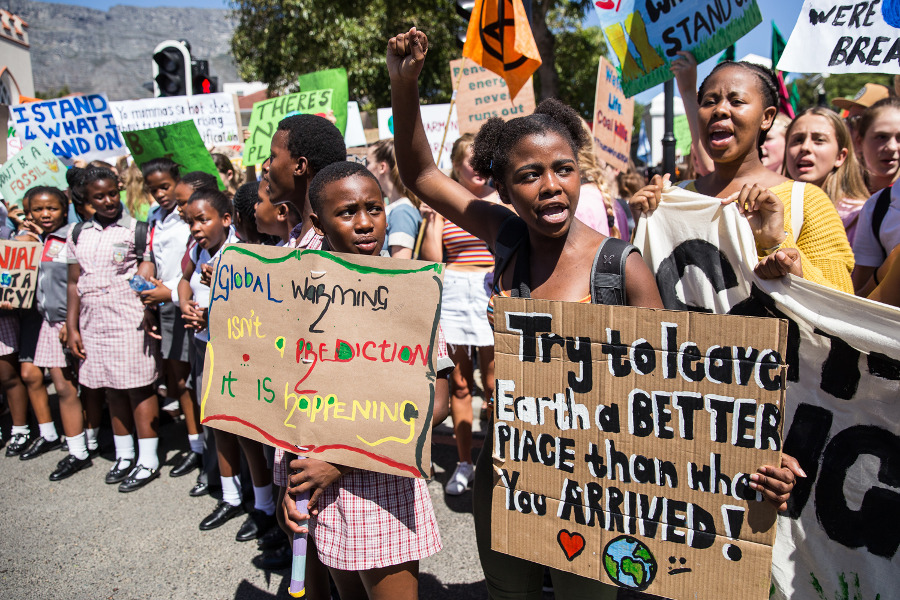
2.4 Systemic Alternatives for Transformative Change
The climate crisis is one of many dangerous ecological crises we face. Through addressing the climate crisis, which affects everything, we can also find solutions to end the war with nature more generally. Systemic alternatives are necessary to address the systemic causes of climate change. We reject solutions that prolong the use of carbon, reproduce the same system, perpetuate inequality and postpone transformative action.
There are peoples’ alternatives to bring down carbon emissions, ensure we can meet our basic needs, enhance our capacity to deal with climate disasters and prepare us to regenerate life-supporting systems, after climate shocks. Such systemic alternatives have been imagined, are part of peoples struggles to decarbonise societies and need to be taken forward now as part of the deep just transition. Such alternatives will change our everyday lives, the entire system we live in, policies and individual behaviour. We are committed to advancing such alternatives and democratic systemic reforms from below:
- Democratic and Participatory Deep Just Transition Plans: every community and workplace needs to develop a deep just transition plan that goes beyond an energy transition to meet their needs, decarbonise and advance systemic alternatives. Such plans must also be guided by the goals and principles for the deep just transition set out in this charter.
- Socially Owned and Community Based Renewable Energy through a Rapid Phase Out of Fossil Fuels: our dependence on coal, oil and gas has to be ended through socially owned and community based renewable energy systems, based on solar, wind, hydro and tidal power for our workplaces, homes and communities. Such renewable technologies must be industrialised in South Africa, using renewable energy. Energy efficient use and technology will be crucial in this transition. Divestment from fossil fuels, an end to fossil fuel subsidies and an end to extraction such as fracking, more coal mines and off shore extraction are imperative. All big energy generators like ESKOM and SASOL have to commit to deep just transition plans that secures the interests of workers, affected communities and future generations.
- Re-agrarianise through Food Sovereignty: every community must prioritise small scale, agro-ecological farming, to meet local needs. The right to food must give control to producers and consumers so they have power over their own food systems to ensure bio-diversity, control of seeds, culturally appropriate food, the importance of indigenous knowledge, local markets, control of the water commons, the eco-social function of land and good health. Big farms need to be deconcentrated, to ensure land justice, but in a manner that is fair, strengthens reconciliation and builds solidarity.
- Democratise the Water Commons: water as a public good needs to be conserved, protected from pollution, its use democratically planned and it must affirm citizens’ rights to consume such a resource. Thus, water in dams, in rivers and in aquifers must meet the needs of society. Water management institutions must be democratised to ensure effective citizens participation. All households and workplaces must be equipped to harvest, bank and save water. Boreholes, private dams and sharing of common water resources has to be regulated. Heavy penalties must be levied on those that pollute water resources, waste it and steal such resources. Water infrastructure must be upgraded, managed and monitored to ensure efficient use. Water savings from phasing out coal generation and big industrial scale farming must enhance the water commons. A water conscious society has to be promoted.
- Transforming the World of Work through Climate Jobs, the Solidarity Economy and the Basic Income Grant: work is important to earn a decent wage, develop skills and contribute to the economy. Climate jobs is about bringing down carbon emissions as well. There are jobs in zero carbon activities and industries. Such jobs are central to the deep just transition and need to be planned in. Lifelong skilling and training are also crucial to support the creation of climate jobs. Climate jobs are also supported by collective, values-based and eco-centric approaches to production, consumption, financing and ways of living through the solidarity economy. Such an economy is based on needs and institutionalised through worker cooperatives, community trusts, communal associations, democratic public utilities and other collective institutional forms that democratise economic power. Together with a basic income grant (BIG) all workers can be protected in the transition required and society more generally will have a cushion. The BIG will also assist with worsening unemployment, end dependence on wage earning, slow down society, push up wages of the employed, enable the solidarity economy and generally promote human flourishing.
- Eco-mobility and Clean Energy Public Transport Systems: walking, bicycles, horses and donkeys need to be promoted as eco-mobility modes of transport. Cities and towns also need to be pedestrianised to limit the use of cars and provide infrastructure for eco-mobility. Every community needs to be integrated into a mass transit system involving buses, trains and trams running on renewable energy and hybrid technologies. Non-electric cars, based on fossil fuels, must be phased out. Air and sea transport must also be decarbonised or limited.
- Zero Waste and Simple Living: mass consumption of commodities and ‘celebrity lifestyles’ are resource intensive, wasteful and carbon centric. Moreover, landfill sites, incineration of waste and pollution of eco-systems are harmful. Zero waste closes the loop through recycling, reuse, sustainable design and dematerialising our economy so there is less or zero extraction of materials. Also certain technologies like single use plastic have to be banned. Together with simple living we can live with minimal resource and carbon footprints.
- Eco-social Housing and Transition Towns: this includes eco-communities, villages, towns, municipal rental schemes and cities where construction methods use natural materials, have minimal impact on the environment, provide for land needs that meet the needs of individuals as part of a community, and also addresses the holistic needs of members of such communities through various collectively determined decisions for housing, food production, sustainable water use, biodiversity, child rearing and culture. Cement is not used in this context given its huge carbon footprint and has to be phased out as a building technology.
- Beyond Growth Through a Happiness and Wellbeing Index: the quality of people’s lives is more important than the amount of goods and services produced in a society. Our economies have to serve our needs as socio-ecological beings. Hence, happiness and human wellbeing are crucial concepts and tools to assess the state of the lives of people. This should serve as the basis of agenda setting, policy, allocating resources and planning.
- Ecological Debt, Worker and Public Finance for the Deep Just Transition: the wealthy in our societies have consumed lots of resources, negatively impacted on eco-systems and have huge carbon footprints. They owe us all an ecological debt and have to carry the financial burden of the deep just transition. This means a climate debt tax for the rich, high taxes on flying and electric cars, a progressive carbon tax targeting corporations and climate justice tariffs on carbon criminal corporations and governments. Workers need to leverage pension and provident funds, through worker control, to ensure the deep just transition meets their needs. Trade unions also need to support the creation of a national cooperative bank for the deep just transition to assist workplaces, communities and households with the energy transition and the realisation of deep just transition plans. Public finance also needs to be harnessed from eco taxes, from penalties for pollution, withdrawing subsidies to fossil fuels, and other sources.
- Indigenous Knowledge, People’s Science and Technological Innovation: knowledge systems are crucial to address the climate crisis. Indigenous knowledge has powerful resources to assist us and has to be retrieved, learned and respected. Earth system science, including climate science, is essential to inform the public about the climate crisis and its challenges. This has to be shared in a manner so every person understands what is at stake, the complexity of the problem and the urgency for action. Climate science as people’s science has to be complimented by the organic knowledge of lived experience based on observing and learning from eco-systems. Given the complexity of climate change, technological innovation to ensure systemic transformation and to advance the public interest must be supported.
- Emergency, Holistic and Preventative Health Care: workable, accessible and responsive public health care systems are crucial to meet people’s needs but also address the harms that come with climate change. Such health care systems must be capable of dealing with emergencies, psychological trauma, diseases and new epidemics that will come with climate change. Holistic care and a preventative orientation at the grassroots have to be strengthened.
- Rights of Nature and Natural Climate Solutions: all living creatures need to be respected. All life and all ecosystems on our planet are deeply intertwined and need to exist, persist and regenerate their vital cycles. Our forests, oceans, mountains, deserts and rivers are all part of living eco-systems. Some are also deemed sacred. Other animals also share the world with us. The rights of nature recognises the intrinsic value of all non-human life forms. At the same time, nature has its own solutions to climate change. We can learn from this and work with this. Such solutions include conservation, restoration and land management activities that increase carbon storage and/or avoid greenhouse gas emissions across forests, wetlands, grasslands, coastal ecosystems and agricultural lands.
- Climate Conscious Media: the media needs to take the science of climate change more seriously and inform the public about the climate crisis, policy issues and the systemic alternatives required. Climate news has to be mainstreamed in radio, television and print media. Editors and journalists need to be trained and resources channelled to ensure coverage and partnerships developed with scientists, academics and international news outlets to cover climate news seriously.
2.5 Toward a Climate Justice State
The South African state has to be a climate justice state that recognises the climate emergency. It has to be guided by the vision, goals, principles and people-led systemic alternatives contained in this charter and all its climate policies must be aligned to realise this charter. More specifically a climate justice state will also:
- Enable participatory planning for deep just transitions from below;
- Develop public finance mechanisms such as green bonds, provide a climate mandate to the Reserve Bank, and advance the tax proposals in this charter;
- Ensure progressive regulations that will curtail the destructive logic of capital, place limits on corporations, and importantly, will place a ban on any future fossil fuel extraction.
- Decarbonise all its practices and achieve a zero carbon footprint in all its activities;
- Streamline its administrative design as our geography changes and parts of the country become unliveable. Prepare the country for sea level rise and take appropriate measures as part of participatory planning. Strengthen local government to have enhanced powers and competencies to deal with the climate crisis breakdown. Strengthen institutional capacity for climate disaster management including establishing a national fire service, ensure public hospitals are fully functional, rapid response emergency teams, increased capacity for the weather services and disaster management infrastructure;
- Promote research and innovation to deepen systemic transformation for deep just transitions from below and information sharing with the public and through climate crisis education in the schooling system and all public institutions;
- Reduce all wasteful spending, punish rogue government officials, end corruption and political deployments, and professionalise the state bureaucracy by appointing the best people in the country to serve in government. A truly non-racial bureaucracy must be created.
- Advance a climate justice orientation in its international relations, including renewing Pan-Africanism through promoting a climate justice position amongst African governments to demand climate debt reparations from the global north, climate justice sanctions against carbon criminal states, a solidaristic approach to refugees and migrants, research, systemic alternatives, renewable energy pooling, climate disaster response capabilities and call for an ‘End To Fossil Fuel Treaty’ in the UN system that benefits African governments.
2.6 People’s Power for Transformative Commoning
A climate justice future can only be achieved through the power of a united people. We have learned this through the struggle against colonialism, apartheid and neoliberalism.
Power lies in different parts of society, in the systems we build, the organisations and movements that we are part of, and in the street politics we do. People’s power is crucial for defending the natural and living basis of our society, such as the land, oceans, forests, plant life, the biosphere and other species. People’s power has to be at the forefront of defending the living commons that sustains us and future generations.
Human beings are an adaptable and flexible species. We know what is wrong, the causes of the climate crisis and we have solutions. As an intelligent species we cannot be held back by a carbon addicted power structure that merely benefits the few. We have answers to prevent extinction and bring about the required socio-ecological transformation. There are crucial democratic systemic reforms, being advanced through people’s power, all over the planet and at the grassroots in South Africa, despite carbon ruling classes. These systemic alternatives are working, giving us glimpses of an emancipated future and have the greatest potential to reverse climate change. This Climate Justice Charter is a signpost, a trumpet call, a spur, to move all of us in the direction of system change. Let’s take a stand and act now, in South Africa and through international solidarity, before it is too late.
Forward to the Climate Justice Charter and Deep Just Transition to Sustain Life! •
For more information about the charter, see safsc.org.za website.


